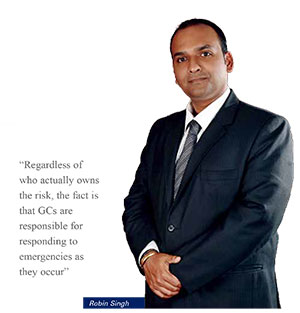While being general counsel (GC) may have its merits, there are also certain perils that cannot be denied. Due to the sheer number of scandals that have erupted in recent years involving white collar crime and insider trading, along with the stress associated with the economic crisis, the role of the corporate regulations has significantly expanded. A GC serves as a supervisor of sorts to ensure corporate compliance and governance. Consequently, it has become vital to analyse the methods associated with the expansion of the general counsel’s role.
The modern role of general counsel — an introduction and background
In order to do that analysis, we must first examine the background associated with the general counsel’s role, which traditionally is to advise corporate boards of directors regarding their oversight responsibilities. The goal of such oversight is to ensure the best interest of the company as well as its stakeholders. GCs are also responsible for handling a tremendous assortment of other duties, such as legal cost management, corporate transactions that tend to be highly complex and even ensuring the corporation is in compliance with both federal and state regulations.
When the GC also serves as the chief legal officer for a corporation, he or she is responsible for providing the board of directors with legal advice. This, naturally, can lead to conflicts in which the GC could very well be at risk of being terminated should they provide information or counsel that is not what the board wishes to hear.
The pressures and priorities propelling the actions of general counsel
In survey responses, GCs tend to identify similar operational and business priorities. Most priorities can be tied directly to risk management, cost control, and operational efficiency. At the same time, GCs tend to face a number of significant pressures, including an increasing regulatory environment and compliance challenges. Additionally, GCs must also cope with concerns related to data privacy and data security. Consequently, they must operate in a rapidly evolving world of global change. In light of such increasingly competitive pressures, what GCs want and need tends to be driven by the need to keep costs under control while at the same time working to boost productivity and efficiency.
 Working in a world of increasing complexity Ultimately, the goal of a GC is to determine both the strengths as well as the vulnerabilities of a company, while simultaneously preventing critical issues before they actually occur. In the past few years, the role of GCs has grown extensively to encompass a broad array of other areas, including compliance, regulation, risk and HR. As a result, general counsel must now work in a world of ever-increasing complexity. As companies and organisations continue to become more and more complex, GCs have found it necessary to significantly expand their expertise in an effort to simply keep up with the changes surrounding them. The debate — who are the owners of enterprise risk? Where does regulatory compliance fit in? The cyber challenge Moving forward, GCs must play a vital role in helping their organisations remain both legally and ethically compliant, while simultaneously providing necessary legal advice regarding the best strategy for approaching risk. |




















